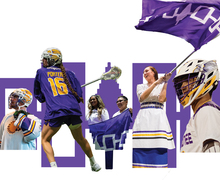Syracuse football recruits through social media, following a nationwide trend
Illustration by Lucy Naland
The video started with Dino Babers stepping to the podium at his introductory press conference. His speech was scored by an underlying piano ballad, which quickly yielded to heavy bass. It resembled an action movie trailer, with the Syracuse football team playing the part of underdog. Then, crowd noise and ¡MAYDAY!’s “Last One Standing” thundered in over highlights. A title swiped in over the lower-third of the frame: “No. 2 Clemson vs Syracuse — The Extended Cut.”
The video was posted by @CuseFootball on Oct. 17, four days after Syracuse upset then-No.2 Clemson. It has been viewed more than 200,000 times on Twitter, Facebook and YouTube, per Syracuse Athletics. The clip serves as proof of what Babers promised at his first press conference, but it’s more than that. It’s a product of an SU football “brain trust,” and it’s intended to be an advertisement to potential recruits.
As social media has become increasingly popular over the last decade, football programs like Syracuse have created social media content teams to target prospective players through Twitter and other platforms. They create short videos, slick graphics and mockups of players in uniform. Now, after a fourth-straight 4-8 season, SU’s attention will shift to recruiting in advance of the Dec. 20 early signing day.
“Each of these schools has been acting like (its) own media outlet now,” said Galen Clavio, director of the National Sports Journalism Center at the Media School at Indiana University. “I think schools realize that they are in a completely different competition that just didn’t exist 15-20 years ago.”
Across the ACC, football programs are creating similar groups in order to get a leg up on the new era of recruiting. Nine of 14 schools have designated teams for social media content. Four schools, including Syracuse, have entered the space within the last two years. SU’s content team is composed of Dave Gunn, Seth Reedy, Austin Beehner, Tyler Cady and Michael Lang. The latter three masterminded “The Extended Cut.”
“We’ve shifted our philosophy a little bit and prioritized more of the social media content to where our recruits are consuming all their information,” said Gunn, SU’s digital media managing editor. “… That’s our priority.”
SU began to reshape its department three years ago. Gunn, who joined the department as an assistant director of athletic communications in 2011, moved to his current position in 2014. He produces material for SU’s social media accounts, website and YouTube channel. Beehner, football’s director of video operations, has been on staff since 2013, per cuse.com, and his role has also shifted into the digital space.
In 2014, SU hired Cady, assistant director of athletic communications. Two years later, SU brought in Lang, a video producer who was a graduate student intern, for a full-time position. In November 2016, Reedy came in as a recruiting assistant in charge of graphic design, per cuse.com. In the years leading up to his employment at SU, he worked with content teams at Appalachian State and Southern Mississippi.
“The benefit of having this staff is that we can bounce stuff off of each other.” Gunn said. “It works as a checks and balances … These guys work right with football so they know (Babers’) message and what he wants to do.”

Andy Mendes | Digital Design Editor
The group has aimed for “snack-sized” videos. The Monday before each football game, the group will plan out four to eight videos, including a uniform reveal, a hype video and a travel video, if the Orange has a road game. Lang and other videographers canvas tailgates to capture clips of excited fans.
Within 30 minutes of the game ending, they work to put out a one-minute long recap. Due to television restrictions, schools cannot post replays. Knowing this, SU’s videographers focus on crowd shots to tell the game’s story. If SU wins a big game, they edit together an “extended cut.”
“Our administration and coaching staff identified a need and a position,” Gunn said. “We needed to be competitive with our peers.”
Heading into enemy territory.#OITNF ?? #SYRvsMIA pic.twitter.com/4DxEzFKuOq
— Syracuse Football (@CuseFootball) October 20, 2017
One of Syracuse’s peers started the trend nearly four years ago. In Atlanta, the night before Clemson took on Louisiana State in the Chick-Fil-A-Bowl, Dan Radakovich and Tim Match, two high-ranking officials in CU’s athletic department, pondered the future of the Tigers’ sports information office. At a 2016 sports media conference, Match said the objective was to turn the Tiger athletic department into “an advertising agency.”
Ten months after the bowl game, Clemson hired Jonathan Gantt and three others to show CU social media followers what it felt like to be a part of a football program. The plan worked. Athlon Sports ranked Clemson as one of the top Twitter accounts in the nation last year. According to media reports, CU has garnered 1.5 million new followers over the last three years.
There are few numbers that can calculate the investments made by these schools. Sports Illustrated studied Clemson and Ohio State’s creative content teams in 2016 and reported that each school added about $100,000 to its payroll. The rest of the ACC, including Syracuse, is left trying to catch up in what Gunn referred to as a “digital arms race.”
“I don’t think we know what the financial ramifications are yet,” Clavio said.
Syracuse may have an advantage over Clemson in one area: student interns. For home games, SU has a “war room” in the Carrier Dome. Inside, the “brain trust” and student interns churn out content. When Gantt started at Clemson, he scoured the campus to find interns without many results. CU doesn’t have a communications school. Syracuse has the S.I. Newhouse School of Public Communications.
Clemson has only one graphic designer, one videographer and 10-to-15 student interns to cover CU’s 19 teams, Gantt said. Eighteen staff members worked the SU-CU game for Syracuse.
“The media room is pretty much all students staffing,” Gunn said. “… We’re Syracuse and we’ve got the schools with students who (cross over into this field). We’ve done a better job in the past year by kind of tapping into that resource, identifying talent and bringing them on board.”
However, there is one crucial recruiting aspect that a social media team: winning. Since 2013, the Tigers have gone 40-7, including winning the 2016 College Football Playoff. The Orange lost its only bowl-game appearance in that same span.
“I think recruiting comes down to a lot of factors that don’t necessarily have to do with how the program looks on Twitter,” Clavio said. “It’s a very, very small part of a much larger equation of getting recruits to pay attention to your school. … I’ve yet to see any psychological research that indicates that recruits are going to be swayed by more attractive graphics.”
Ready to roll in Louisville.
It's Game Day!#OITNF ?? pic.twitter.com/0RS9ZL4ceY— Syracuse Football (@CuseFootball) November 18, 2017
SU tracks the engagements and impressions on each of its posts, yet there’s no way to tell if recruits are seeing or care about them. For universities increasing investment into social media teams, there is no data to show if it’s influential. Teams are still “a long way away from having any specific proof,” Clavio said.
Gantt and Clemson look for “anecdotal” evidence from recruits to see if their tactics are working. He compared a social media team’s impact on a team to a new state-of-the-art facility. Both, however, are difficult to quantify in how much they directly impact recruiting. Gantt emphasized that there has to be belief within an administration that the process is working. Last year, Clemson built a $55-million football complex.
Still, until teams are proved wrong, social media promises to be the new battleground to attract recruits, at least until a new way arises.
“What can you do to stand out among the sea of content that everybody else is putting out?” Gunn said, asking the question that teams across the country wrestle with daily.
“Everyone is going to have graphics,” Lang responded. “… What are people not going to think about?”
Gunn reemphasized the need to innovate: “Because next year’s recruits are watching.”
Published on November 29, 2017 at 11:21 pm
Contact Nick: nialvare@syr.edu | @nick_a_alvarez





